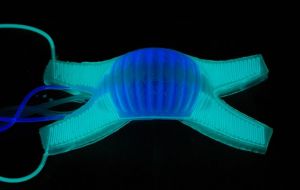MercoPress. South Atlantic News Agency
US scientists develop a translucent polymer robot inspired in the squid
 The ‘squidgy’ can crawl, camouflage and hide from infrared cameras (Photo: AFP)
The ‘squidgy’ can crawl, camouflage and hide from infrared cameras (Photo: AFP) Scientists in the United States said they had devised a rubbery robot, inspired by the squid and octopus, which can crawl, camouflage itself and hide from infrared cameras. The Pentagon-backed gadget is the latest type of a so-called soft machine, meaning silicone-based robots that are made from squidgy, translucent polymers.
The prototype incorporates a thin sheet of special silicone with microscopic channels through which coloured fluids are pumped so that the robot's “skin” mimics the colours and patterns of the surrounding environment.
By pumping heated or cooled liquids into the micro-channels, the researchers can also mask the robot thermally so that its infrared signature does not stand out against a cold or hot background. The prototype is a four-legged entity, 13 centimetres long.
Its limbs are splayed out in the form of an X and, using compressed air, flex like a child's toy, enabling the little machine to crawl forward with a lurching left-right movement.
“When we began working on soft robots, we were inspired by soft organisms, including octopi and squid,” Stephen Morin, a specialist in chemical biology at Harvard University, said in a press release.
“One of the fascinating characteristics of these animals is their ability to control their appearance, and that inspired us to take this idea further and explore dynamic colouration.”
Morin added: “Even when using simple systems -- in this case we have simple, open-ended micro-channels -- you can achieve a great deal in terms of your ability to camouflage an object, or to display where an object is.”
The research is published in the US journal Science.
Its financial backers were the US Department of Energy and the Pentagon's Defence Advanced Research Projects Agency (DARPA), which supports research into innovative technology with military potential.




Top Comments
Disclaimer & comment rules-

Read all commentsPity this is a Pentagon project; apart from that, sounds quite cool!
Aug 19th, 2012 - 05:18 pm 0Commenting for this story is now closed.
If you have a Facebook account, become a fan and comment on our Facebook Page!